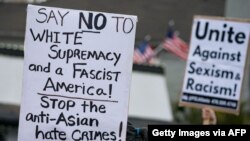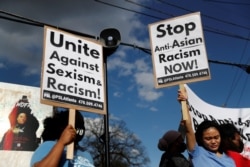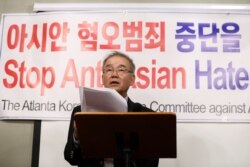In the killings of eight people at three spas in the Atlanta metropolitan area on Tuesday, police quickly found a suspect. Twenty-one-year-old Robert Aaron Long was arrested within hours of the shootings and subsequently confessed to the crimes.
Far less clear, however, is what prompted him to allegedly kill six Asian American women and two other people, and whether it was a hate crime subject to the harshest penalties the state or federal government could bring.
While not ruling out racial bias as a motive at a time when Asian Americans are under attack across the country, law enforcement officials in Georgia said Wednesday that Long told them he had been motivated not by race but by a desire to fight his “sex addiction” by eliminating “temptation.”
To many Asian American activists, Long’s alleged motive was a rush to judgment. In effect, the police and sheriffs involved in the investigation were lending credence to his explanation before all the facts in the case are known.
“When was the last time that you saw law enforcement take the word of the accused killer and turn around and tell you, ‘He said it wasn't a hate crime, so I guess that's not a hate crime,’” said Chris Kwok, a board member of the Asian American Bar Association of New York.
The FBI defines a hate crime as a “criminal offense against a person or property motivated in whole or in part by an offender’s bias against a race, religion, disability, sexual orientation, ethnicity, gender or gender identity.”
In addition to federal anti-hate crime laws going back to the 1960s, all but three U.S. states have their own hate crime statutes. The southeastern state of Georgia became the latest last year to enact a hate crime law.
Acting as “penalty enhancers,” most state hate crime laws mandate an increase in sentencing when an underlying crime is motivated by hate. In Georgia, for example, a hate crime conviction carries an additional six to 12 months in prison for a misdemeanor and at least two years in prison for a felony. Georgia criminal law carries a possible death penalty for murder.
But proving a hate crime can be challenging, which is one reason most hate crimes are not prosecuted. To win a hate crime conviction, prosecutors must establish not only that a crime occurred but that it was committed for a “discriminatory reason,” explained Brian Levin, director of the Center for the Study of Hate and Extremism at California State University, San Bernardino.
“That discriminatory reason does not have to be the sole motivating factor, but courts have generally held that it must be a significant motivating factor,” Levin said in an interview.
Making matters more difficult for prosecutors, sometimes more than one motive may be at play, according to legal experts.
“You’re really trying to get into the heads of the perpetrators, and sometimes it's not that clear,” said Angela Hsu, president of the Georgia Asian Pacific American Bar Association. “Sometimes, people don't clearly communicate their intent, or their intent may be bundled up in other types of motivations.”
The Georgia shootings come amid a spike in anti-Asian hate crimes fueled by the outbreak of the COVID-19 pandemic last year. While Long, who is white, has denied a racial animus toward his victims, his statement alone is not enough to rule out a hate crime in the case, according to legal experts. Criminal defendants often downplay their crimes and the circumstances surrounding their acts in order to minimize legal exposure.
“It's important for law enforcement and the prosecutors here to look at all evidence related to the motivation,” said Arusha Gordon, associate director of the James Byrd Jr. Center to Stop Hate at the Lawyers’ Committee for Civil Rights Under Law.
“We know that sometimes there is evidence in terms of the social media accounts that perpetrators may be part of, whether it's various online groups, other things the defendant may have said online or offline, or other things such as tattoos,” Gordon said.
Oftentimes, this type of evidence comes to light months after a crime is committed, Gordon said. In the 2020 murder of Ahmaud Arbery, the unarmed 25-year-old Black man who was chased and fatally shot while jogging in rural Georgia, prosecutors learned several months later that one of his killers had used a racial slur after shooting him.
No evidence of this kind has emerged so far in the case of Long, the son of a youth pastor who became estranged from his family over his alleged sex addiction and behavior. But Asian American rights advocates and others cautioned against jumping to conclusions about motive and whether Long should be charged with hate crimes.
Law enforcement officials say they are pursuing all leads. On Wednesday, officials from the FBI and other law enforcement agencies met with members of the Asian American community to brief them on the investigation.
“The message that they were trying to get across to the community is that they're looking at all different aspects,” Hsu said of the FBI. “And I think that that's appropriate at this stage.”
A spokesperson for the FBI’s Atlanta Field Office confirmed that the meeting took place but declined to elaborate.
Ultimately, regardless of whether Long is charged with hate crimes, Asian American leaders see the shootings as an assault on their community.
“The obvious thing is that this is a targeted crime, because he targeted three businesses, and six Asian Americans were killed as a part of this shooting spree,” Hsu said. “And so, I think the obvious (conclusion) is that this was directed at Asian Americans.”






